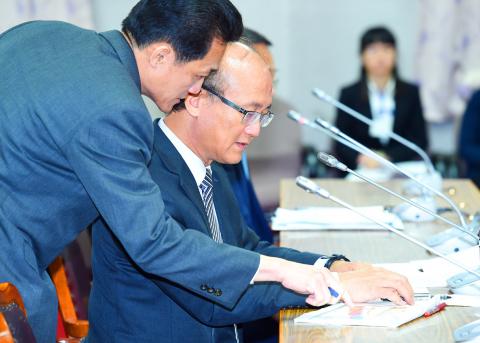The Ministry of Education has only taken action against one service that offers thesis ghostwriters, even though punishments for such a breach of academic integrity were introduced six years ago, Democratic Progressive Party Legislator Kuan Bi-ling (管碧玲) said yesterday.
Advertisements for illegal thesis writing services are “rampant” online, Kuan told lawmakers during a meeting of the Judiciary and Organic Laws and Statutes Committee at the Legislative Yuan in Taipei.
A Google search finds an “infinite number” of Web pages offering all kinds of writing services for master’s or doctoral theses, she said, adding that there are even apps for such services available for download.

Photo: Liao Chen-huei, Taipei Times
According to Article 18 of the Degree Conferral Act (學位授予法), any attempt to attract or coerce a student to hire a ghostwriter to write their degree thesis or assignment would result in a fine of NT$300,000 to NT$1 million (US$9,723 to US$32,409), she said.
A separate fine would be imposed for each breach, she added.
“Given that each illegal advertisement could be fined at least NT$300,000, the Ministry of Education could have contributed a great deal of money to the Treasury,” she said.
However, the ministry has turned a blind eye to the law “as if it does not exist,” she added.
Since the penalties were introduced in May 2013, “the only advertisement that got fined was in 2014,” she said. “No wonder illegal advertisements are rampant.”
Hiring a ghostwriter to write a thesis is unethical, Deputy Minister of Education Lin Teng-chiao (林騰蛟) said, adding that he is unfamiliar with the ghostwriting phenomenon, but has heard about it.
“Since the ban is laid down in law, it should be executed,” he said, vowing to enhance enforcement of the law.

The inspection equipment and data transmission system for new robotic dogs that Taipei is planning to use for sidewalk patrols were developed by a Taiwanese company, the city’s New Construction Office said today, dismissing concerns that the China-made robots could pose a security risk. The city is bringing in smart robotic dogs to help with sidewalk inspections, Taipei Deputy Mayor Lee Ssu-chuan (李四川) said on Facebook. Equipped with a panoramic surveillance system, the robots would be able to automatically flag problems and easily navigate narrow sidewalks, making inspections faster and more accurate, Lee said. By collecting more accurate data, they would help Taipei

STATS: Taiwan’s average life expectancy of 80.77 years was lower than that of Japan, Singapore and South Korea, but higher than in China, Malaysia and Indonesia Taiwan’s average life expectancy last year increased to 80.77 years, but was still not back to its pre-COVID-19 pandemic peak of 81.32 years in 2020, the Ministry of the Interior said yesterday. The average life expectancy last year increased the 0.54 years from 2023, the ministry said in a statement. For men and women, the average life expectancy last year was 77.42 years and 84.30 years respectively, up 0.48 years and 0.56 years from the previous year. Taiwan’s average life expectancy peaked at 81.32 years in 2020, as the nation was relatively unaffected by the pandemic that year. The metric

TAKING STOCK: The USMC is rebuilding a once-abandoned airfield in Palau to support large-scale ground operations as China’s missile range grows, Naval News reported The US Marine Corps (USMC) is considering new sites for stockpiling equipment in the West Pacific to harden military supply chains and enhance mobility across the Indo-Pacific region, US-based Naval News reported on Saturday. The proposed sites in Palau — one of Taiwan’s diplomatic allies — and Australia would enable a “rapid standup of stored equipment within a year” of the program’s approval, the report said, citing documents published by the USMC last month. In Palau, the service is rebuilding a formerly abandoned World War II-era airfield and establishing ancillary structures to support large-scale ground operations “as China’s missile range and magazine

Passengers on Taiwan High Speed Rail (THSR) will be required to use headphones and make phone calls in gangways under new “quiet travel” rules starting Sept. 22. THSR Chairman Shih Che (史哲) told media that THSR will run a three-month promotional campaign to ensure widespread adoption of the new rules. Those repeatedly ignoring the guidance face the potential termination of their transport contract, which can result in them getting escorted off the train, according to THSR. Shih shared his hope to cultivate an environment conducive to rest and reading for the train’s passengers, stating that these changes aim to “promote self-discipline” among passengers